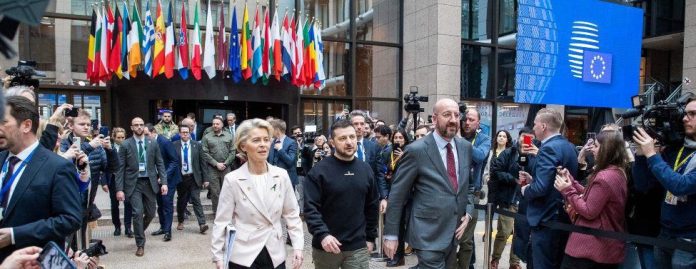EU expansion requires a restructuring of the internal mechanisms of the Union, The Economist reports.
War in Ukraine has changed the geopolitical structure of almost the entire globe, from China to India via Turkey. Perhaps some of these changes will be fleeting. However, one change is sure to be long-lasting: the formation of a new European order, which has been hotly debated recently. The war in Ukraine has left Brussels scrambling to admit new members for the first time in more than a decade and prepare the bloc for what is likely to be its last major enlargement.
On the sixth of October, the leaders of the 27 EU member states will meet at a summit in Spain to discuss the stages of the bloc’s enlargement and consider how the new union will work. The path to EU membership for the new entrants – Albania, Serbia, Ukraine, Moldova and Georgia – will not be easy.
To join the world’s largest economic bloc, comparable in power to the United States, the current candidates will have to undertake deep reforms that they have so far avoided or are hampered by external circumstances.
From the EU’s perspective, increasing the number of members from 27 today to 36 tomorrow will be possible only if the EU restructures its internal mechanisms. It will be necessary to change the balance of power between the bloc’s central institutions and national capitals, for example, by reducing the dependence of the entire union on the whims of individual countries. Such attempts at internal reorganisation could lead to heated debates at the all-night summits that have become typical of the EU.
Obviously, this process will take a long time. The approximate timeframe being considered – both the applicants and the bloc itself are expected to be ready for expansion in 2030 – seems overly ambitious. However, the very fact that the bloc is already discussing the possibility of accepting new members is remarkable, given that in recent years the willingness of bloc members to welcome newcomers to their ranks has waned markedly.
Union expansion was a hot topic when there were only six countries in it. Over time, the union expanded to 28 members (before the UK withdrew). However, in 2013, when Croatia joined the EU, the enlargement process seemed to have run out of steam: no one else has been admitted to the club since then, and Bulgaria and Romania, which joined the EU before Croatia, had done so back in 2007.
This was partly due to “enlargement fatigue” felt by the EU’s “old guard” – France, for example, which feared that the bloc’s enlargement was at the expense of deeper integration. Others also agreed, especially after the antics of some of the newer members of the union – former Soviet bloc countries that were admitted to the EU in 2004. People have periodically come to power in Poland and Hungary, accused of violating key EU principles on the rule of law. For most of the 2010s, the EU was struggling to get out of the eurozone crisis and did not plan to accept new members. Moreover, Ukraine was too big, too poor, too corrupt and too agrarian to be accepted into a club that cared about its farmers.
The military conflict in Ukraine has changed the point of view of Europeans. A diplomat from a country seeking to become a member of the bloc said:
“Enlargement used to be driven by hope; now it is driven by fear.”
Some countries, which the EU has been promising for too long to accept into its ranks, now intend to cooperate with Russia, Turkey and China, which in turn are ready to flood the region with aid and investments. Previously, this irritated the EU. Now EU perceives this as an unacceptable intrusion into the “backyard” of the bloc.
Reflecting on Ukraine, which by all accounts is the biggest applicant for accession, EU officials wonder: if a neighbouring state with a huge number of battle-hardened people, which was previously excluded from the bloc, is accepted, will it not lead to serious difficulties in the future? The EU will have to assist in Ukraine’s reconstruction in any case. The cost of Ukraine and other countries joining the bloc will be enormous because they are still poor, corrupt and agrarian, albeit to varying degrees. But there are good reasons to believe that keeping them out of the EU will be even more expensive.
